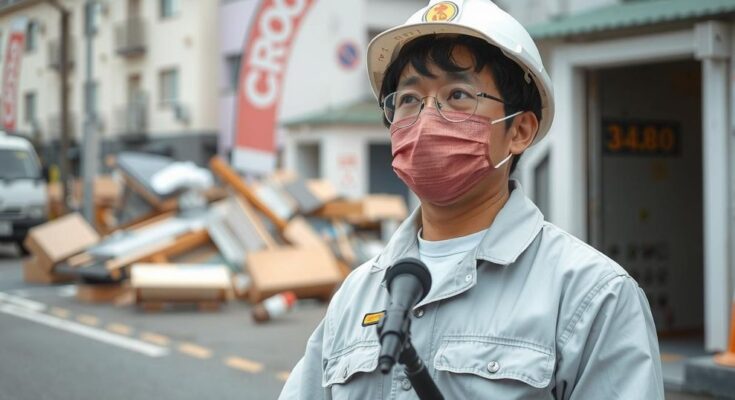Masayuki Fujisawa, a Kobe city employee, served as a support worker in Suzu, Ishikawa, following the devastating Noto Peninsula earthquake. Vowing to share his experiences, he emphasizes the importance of disaster preparedness. He recalls the extensive damage and relates it to the 1995 Great Hanshin Earthquake. His work in public relations in Suzu has been focused on assisting earthquake victims and raising awareness about disaster readiness.
On January 3, 2025, a 30-year-old Kobe city employee, Masayuki Fujisawa, discussed his year-long experience as a support worker in Suzu, Ishikawa, following the Noto Peninsula earthquake. Born shortly before the 1995 Great Hanshin Earthquake, Fujisawa holds personal insight into the impact of disasters. During his service, he managed public relations efforts, including information dissemination on support programs for victims. His recollections of the devastation he witnessed emphasize the urgent need for disaster preparedness in his hometown of Kobe. “Even though people know that preparedness is important, few are able to get ready with a concrete image in mind,” he stated, highlighting the necessity of conveying the realities of disaster preparedness effectively.
The Noto Peninsula earthquake, which occurred on New Year’s Day last year, caused extensive damage in the Ishikawa Prefecture, leading to a call for support from other regions. Following the disaster, many municipalities experienced staff shortages as local workers also became victims of the quake. The situation necessitated the dispatch of support workers from across Japan to assist in recovery efforts. Fujisawa’s insights stem from both personal and professional encounters with such calamities, offering a meaningful perspective on disaster readiness.
Masayuki Fujisawa’s contributions as a support worker during a challenging year following the Noto Peninsula earthquake bring to light the profound necessity of disaster preparedness. His experiences not only inform his public relations role in Kobe but also emphasize the urgency of comprehensive planning for future incidents. With 566 support staff deployed across affected municipalities, the issue of preparedness becomes increasingly critical to safeguard communities.
Original Source: japannews.yomiuri.co.jp




